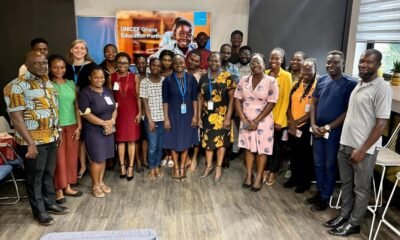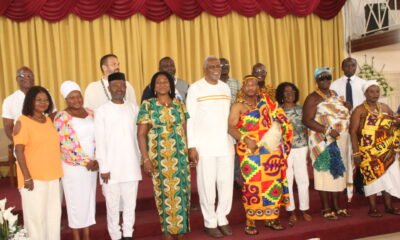News
LaDMA CEO hands over renovated six-unit classroom block to school
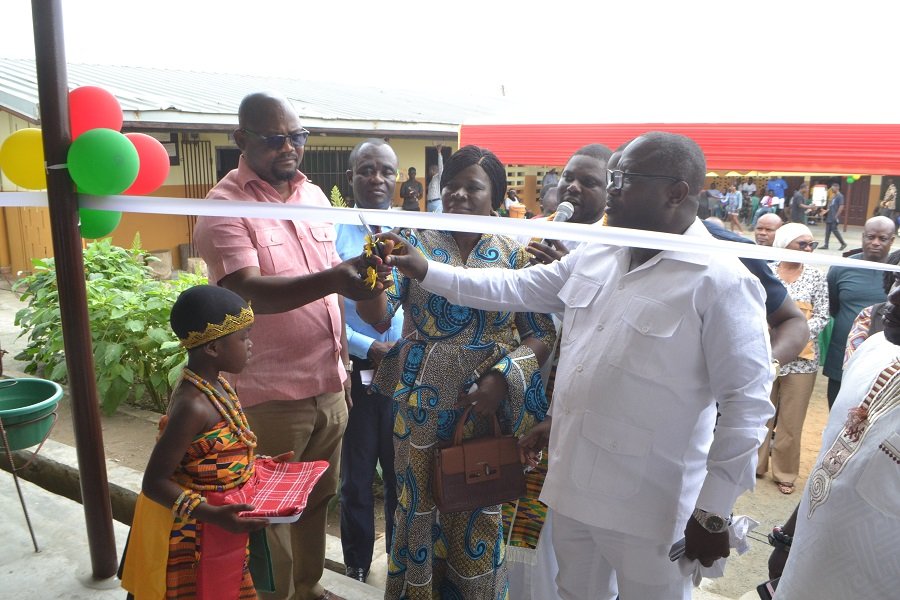
Mr Nikoi (second right) being assisted by (Mrs. Kotomah (middle) to cut the tape for the commissioning of the building programme Photo Victor A. Buxton
The Municipal Chief Executive (MCE) for La Dade-Kotopon Municipal Assembly (LaDMA), Mr Solomon Kotey Nikoi, has commissioned a renovated six-unit classroom block for the La Anteson Roman Catholic Primary and Kindergarten School.
The project, funded from the Assembly’s Internally Generated Funds (IGF) at a cost close to GH¢1m will increase enrollment of pupils in the school.

Handing over the facility to the school authorities, Mr Nikoi reiterated the position of the assembly to prioritise education and the provision of its accessories as one of the focal pillars among their targeted thematic areas of development.
On this backdrop, MrNikoi said the assembly took it upon itself to renovate the old school block which was then in a bad state.
The MCE was optimistic that the new block will boost the morale of the teachers and pupils and also praised the teachers for their commitment and dedication towards the development of the children.
The Municipal Education Director for LaDMA, Mrs Habiba Kotomah, expressed gratitude to the assembly and urged the teachers to enforce strict rules to protect the structure.
Ms Janet Adade, headteacher of the school, said the school had not seen any renovation since it was established in 1952.
The refurbished block has new roofing, ceiling fans, white boards, dual desks, louver windows with mosquito nets, doors, among others.
BY VICTOR A. BUXTON
News
Low budget, teacher absenteeism, causes of poor performance in basic School.
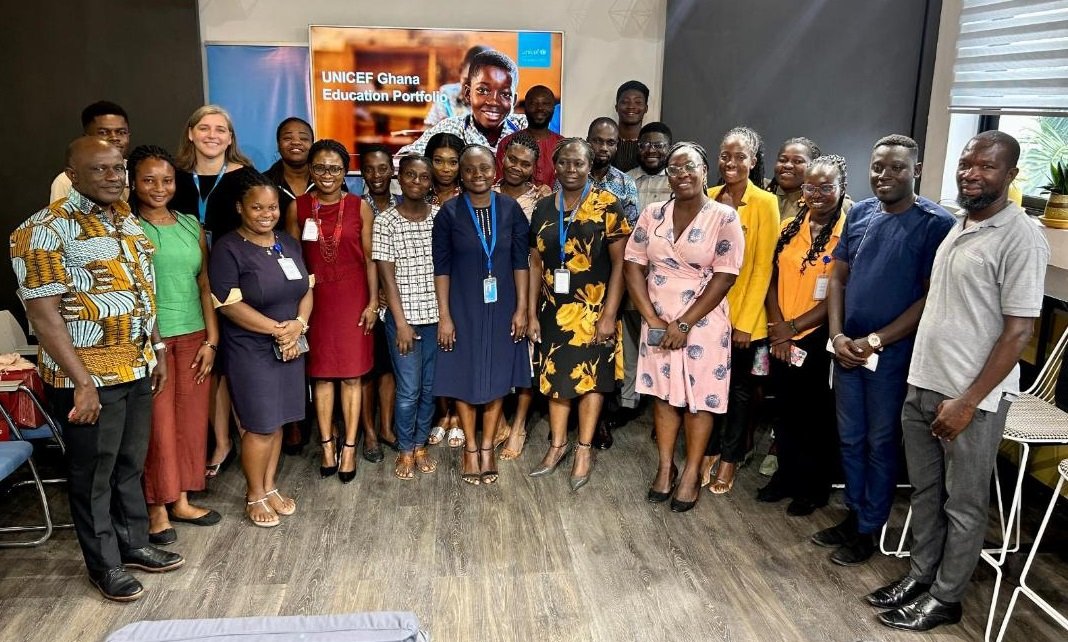
UNICEF education team and journalists at the event
The decline in budget allocation for Ghana’s basic education sector and high rate of teacher absenteeism have been identified as some of the major causes for the drop in performance of school children at that level of education.
According to a United Nations International Children’s Emergency Fund (UNICEF) statistics, a significant decline in basic school allocation has been recorded in recent years, explaining that in 2019, 39 per cent of the education budget was allocated to basic education, but that figure dropped to 19.6 per cent in 2024.
This came to light last week Thursday at the third UNICEF Media Café addressed by the Chief of the UNICEF Education team, Ms Christin McConnell.
According to her, about 98 per cent of the current budget allocated to basic education is spent on salaries, leaving little room for resources such as infrastructure, learning materials, and teacher training which she said had directly impacted the quality of education received by children.
Also, she stated that about 11 per cent of teachers are absent from school on any given day across all the levels, contributing to the non-effective learning for almost six years.
Despite these challenges, Ms McConnell noted that there had been significant progress in early childhood education with over 120,000 kindergarten children receiving basic learning materials and health screening as part of an initiative dubbed, ‘My First Day at School.’
She further stated that UNICEF’s differentiated learning programme which aims at providing remedial education to struggling students has also been instrumental in improving quality and early childhood education.
An Education Officer at UNICEF Ghana, Ms Rhoda Enchill speaking on access and inclusion in education disclosed that an estimated 40,000 children with disabilities in Ghana had never attended school.
According to her, the figure underscores the ongoing challenges faced by children with special needs in accessing education, despite government efforts to make school more inclusive.
She mentioned that 1.2 million children aged between four and 17 were still out of school across Ghana, adding that the figure included 623,000 primary school-aged children who are not enrolled.
Ms Enchill said despite the progress made in access to education, foundational learning levels remain low explaining that children were still struggling to read at the grade levels.
She indicated that results from the 2022 National Standard Test (NCT) revealed that only five out of 10 children in grade four could read.
And as part of efforts to standardise and promote inclusivity and sign language in the country, Ghana has developed a harmonised sign language dictionary for deaf teachers and learners.
A sign language dictionary is a resource that provides definitions, illustrations, or video demonstrations of signs used in a specific sign language.
The dictionary, she stated, will serve as a reference for both deaf and hearing individuals to learn and understand the meanings and hand gestures associated with words, phrases, or concepts in sign language.
By Jemima Esinam Kuatsinu
News
LifeCheck back-to-school programme supports 11,000 children …Offers free health screening in 6 c’nities in 2024 outreach

Over 16,000 people at Teshie and its environs have benefited from this year’s LifeCheck outreach held last Saturday and spearheaded by Empowerment Care Foundation.
Dubbed ‘Life Check 24,’ the exercise was aimed at improving the quality of life for the underprivileged in areas like Teshie, La, Tse Addo, Baatsonaa, Nungua and Spintex Road.
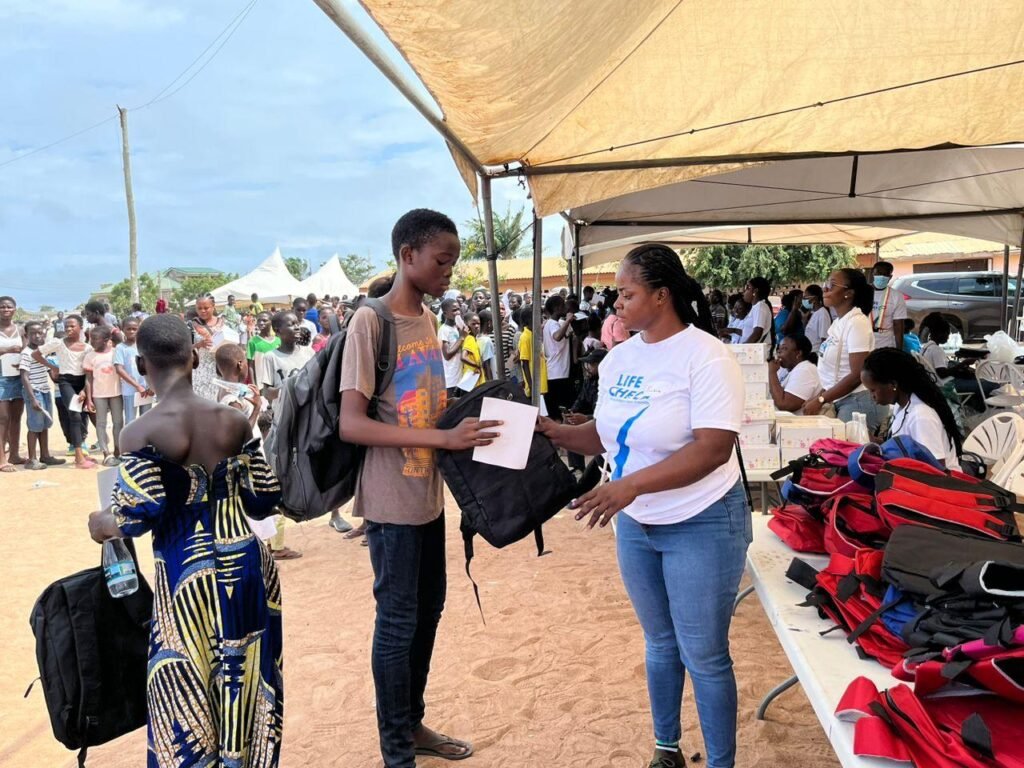
Organised by the Empowerment Worship Centre (EWC), the outreach themed ‘Compassion to Make a Difference,’ it had over 11,000 children receiving exercise books, more than 4,000 schools bags, 5,200 shoes and 100 kids were barbered under the Life Check back-to-school arm.
There was also a free health screening for eye care, dental care, ultrasound scans, minor surgical procedures, and free medication.
Also, over 500 people were registered on the National Health Insurance
Scheme (NHIS), while some adults were screened for hepatitis B, malaria, prostate conditions, typhoid, and blood sugar.
The Global Lead Pastor of EWC, Prophet Gideon Danso, said “Life Check 2024 aligned with the church’s mission to create positive change by touching and transforming lives and improving the quality of life for the underprivileged.”
He noted that the Empowerment Care Foundation had implemented various programmes since its inception in 2014, focusing on healthcare, education and other transformative initiatives.
“This is the 10th year LifeCheck is being held and since its inception, more than
52,000 people have attended, 28,000 people received medical care, over
52,000 individuals fed, and over 32,000 children given back-to-school items.
More than 11,000 have been registered on the NHIS and these figures exclude this year’s target of 15,000 which was exceeded,” he stated.
He said the church volunteers had donated over 50 pints of blood to the National Blood Bank to demonstrate their dedication to helping society.
He expressed the hope that the event was held twice a year to help people in need and assist students to go back to school but that, he said, would call for assistance from other organisations.
A beneficiary, Mrs Gift Mensah, expressed gratitude to EWC and Prophet Danso for showing them love and reducing some financial burden on them as their kids resume school.
BY Cecilia Lagba Yada


